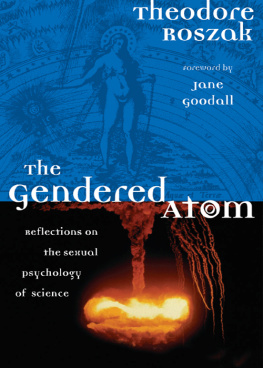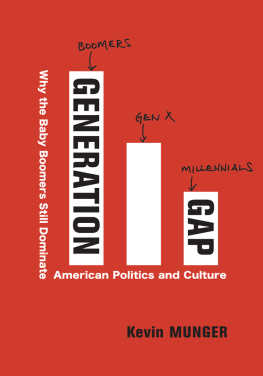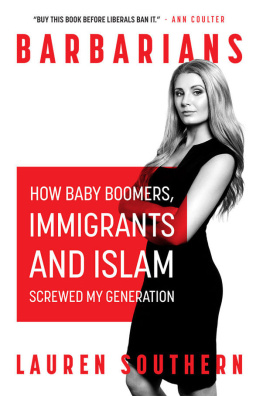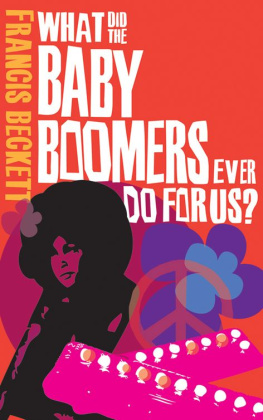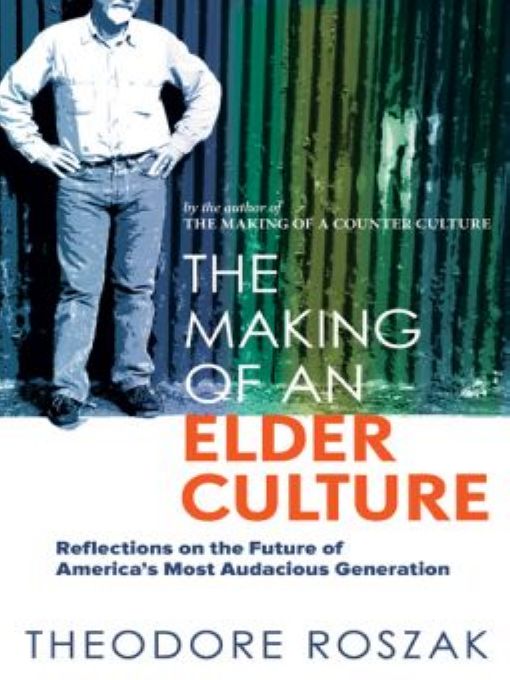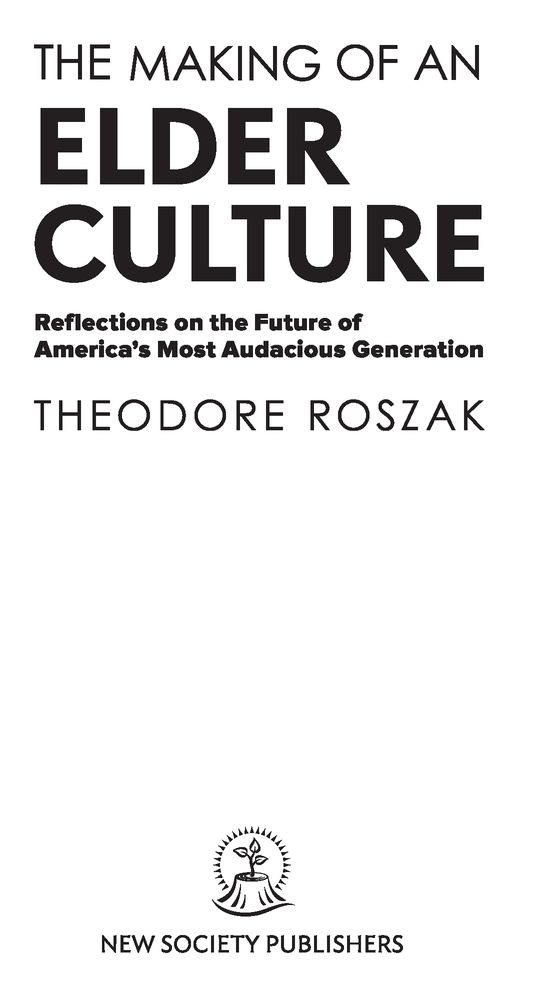Table of Contents
Well... Ive had that experience, she said, smiling a bit sadly.
What experience is that? I asked, having no idea what she meant.
Death of the second parent. My mother died this year. Thats what started me thinking about...well, about everything.
I offered some kind words, noting that my mother died just a while ago. She expressed her sympathy, but then reminded me that, I was born in 1946, as if I ought to know that made a difference.
1946, the first year of the baby boom. So, you see, she said, her smile growing more wistful, theres no way to avoid it any longer. Ive become the older generation.
Acknowledgments
Without the help of the good people at Second Journey and especially Bolton and Lisa Anthony this book would never have been able to climb out of my computer and go walking in the world. If elder culture is going to begin anywhere, it will be with groups like Second Journey.
I am also grateful to the Gray Panthers of Berkeley and their comrades across the country for keeping the heart and soul of Maggie Kuhn alive. They are the best example I can offer of an elder insurgency that serves old and young alike.
CHAPTER 1
Maturity Rules
We are not senior citizens or golden-agers. We are the elders, the experienced ones; we are maturing, growing adults responsible for the survival of our society. We are not wrinkled babies, succumbing to trivial, purposeless waste of our years and our time. We are a new breed of old people.
Maggie Kuhn, A Dialogue on Age
Ready or not, like it or not the modern world is tilting steadily toward gerontocracy. Irresistible trends in family life, medical science, public health, and fiscal economics all run in the direction of senior dominance. Those trends, growing stronger with each passing year, begin to appear as permanent a condition as our species has ever known, the long road into a future nobody anticipated until the latter years of the 20th century.
Not that elders stand ready to take over the day-to-day tasks of government or to lord it over the rest of the population. Rather, what we must now expect is that their priorities will soon have a claim on political power and our economic resources that few elected leaders will care to question or obstruct. There will always be many issues governments must face war and revolution, poverty and terrorism, domestic strife, the ups and downs of the world economy. But for as far as we can see into the years ahead, all these affairs of state will have to play out against a very different, totally unfamiliar background that makes the needs and values of the old paramount.
How can it be otherwise? In another generation most industrial societies will have arrived at an unprecedented condition: Their populations will number more people above the age of 50 than below. Some nations will take a bit longer joining this quiet revolution, as the United Nations has called it, but the United States, western Europe, and Japan are already within sight of senior dominance. As of the first decade of the 21st century in the United States, 8,000 people who were born between 1946 and 1964 the baby-boom generation began turning 60 every day. By 2011 that number rises to 11,000 which is the number of American babies currently being born each day. Already, there is one person over the age of 60 in the United States for every child below the age of four.
Move ahead 50 years. By 2050, there will be ten people over 60 for every three children below the age of four. Wait another generation or so, and there will be more people above the age of 60 than below. Wait another generation beyond that, and... well, beyond that, things grow somewhat speculative, as life expectancy becomes more dependent on breakthroughs in biotechnology aimed at identifying the exact source of aging. But breakthroughs there will be. Geneticists are already competing to produce a Methuselah Mouse that will live the equivalent of human centuries. If they succeed, they will receive handsome rewards and much acclaim. Can we doubt that people will clamor to have the same blessing? And once this longevous vermins genes are grafted into the human genome, who can say how many people will survive to age 160, 200, or beyond? Would that be a good thing? I admit to being uncertain. I cannot envision such a world, nor am I sure I would want to live in it. But it is even harder to imagine anyone willing to demand that we call off the effort.
Meanwhile, even without the aid of advanced genetic tinkering, societies that are preponderantly youthful today will not be so in another 20 years. When we hear that 60% of the population in India is below the age of 30, or that 40% of Iranians are below 25, we should bear in mind that all those young people are grist for the senior mill. They are growing older every day and, like our own boomers, will eventually become the largest senior population in their countrys history. Such is the fate of baby booms. (Remember: When the Summer of Love was happening in San Francisco in 1967, there were 90 million people below the age of 25 in the United States nearly half the population. Youth seemed in a permanent ascendancy. And see where we are today.) Unless we can imagine a science-fiction scenario in which the world is devastated by a plague that primarily targets the elderly, the modern world can only grow older. But, by an ironic twist of fate, the only plague we have going in the world today is AIDS, which strikes at the sexually active young and their afflicted offspring, leaving a disproportionate number of the elderly to inherit the ravaged societies of Africa and Asia.
We lose sight of the demographic force behind mass longevity when we view the baby boom in a short-sighted perspective a transient demographic bulge rather like a pig being swallowed by a python. Seen in that way, we might imagine that at some point in the course of the 21st century the python will have digested the pig and things will return to their normal state of youthfulness, a society of young families, newborn babies, growing children, citizens in their middle years... and here and there some marginal grandparently boomers helping with the kids or retired to a galaxy of their own far, far away. Nothing could be farther from the truth. Since the late 19th century, aging has been the normal state of all industrial societies; it is a sustained trend. Societies designed to cater to the needs of aging populations will soon become the accepted political condition of our species. Acknowledging that fact will, at some point, slide so smoothly into the conventional wisdom that future generations may not realize that this is a major new feature of modern life, this is different, this is not what human culture was ever meant to be and it all started now.
Odd that something so foreseeable has remained unforeseen for generations. The senior dominance has been wholly predictable since at least the beginning of the 20th century. Smaller families, longer life expectancy one simply had to follow where the demographic numbers were trending. In the late 1930s, when hard times had placed a spotlight on the plight of the indigent old throughout the western world, the American philosopher John Dewey predicted with some foreboding that our society was headed toward unprecedented longevity which in his time meant 60, 65, 70 years of age. In a prescient 1937 essay written for the first conference ever held on aging in the United States, Dewey observed, The changes which have brought about a great reduction of infant mortality and the lengthening of the span of life for those who survive the hazards of infancy have had important social effects so that social conditions have been created which confront civilization with issues of the most serious nature. He might have gone on to add that aging was a principal theme of the countrys history. Our society has never been younger than it was at the beginning of white colonization. Then, the continent was experiencing an influx of young immigrant families from Europe who were determined to stock the land with all the children they could beget. Since then we have been growing steadily older, by Deweys day reaching the point at which a third of the population was over the age of 50. The main purpose of these introductory remarks, Dewey wrote, is to call attention to the fact that there is a


